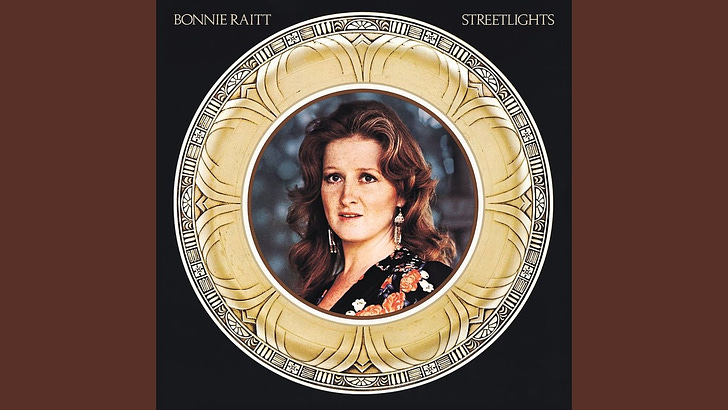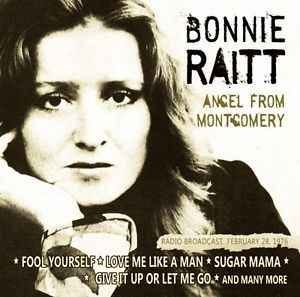“Angel from Montgomery” by BONNIE RAITT
John Prine, even at 24, saw that being old isn't about age, but an absence of youth. Bonnie Raitt sang how that feels to a woman.
To believe in this livin' is just a hard way to go
John Prine thought he was doing it wrong; the silence only confirmed it. Prine wrote the songs for his 1971 debut while walking with a mailbag across his shoulder, taking in scenes of daily life along his route as a letter carrier. He filled those songs with the details he absorbed as he delivered the mail. This is what made him nervous about singing his songs in public – surely there must be a reason why other songwriters weren’t doing it that way; was he just a rank amateur? When he first sang “Angel From Montgomery, a song written from a woman’s point of view, the crowd just sat there. He shuffled his feet, sure that whatever the right way to write a song was, he didn’t understand it.
After a few uncomfortable moments, the applause came, and kept coming. Prine was a storyteller who didn’t tell his audiences a damn thing – he showed them the lives of everyday people, sprinkled with humor and melancholy. He credited Kris Kristofferson (“He’s so good we may have to break his thumbs,” Kristofferson said) and film critic Roger Ebert1 with discovering him in that Chicago folk revival scene2. His 1971 debut, John Prine, earned enough acclaim that he was able to put the mailbag down for good.
“Angel From Montgomery” is a song “about a woman who feels older than she is,” Prine said. He was 24 when he wrote it but didn’t question singing from perspective of a woman up to her wrists in dish soap and dreams gone just as sodden. To him, the character always wrote the story. It was a young woman with an old soul, however, who made that opening lyric “I am an old woman, named for my mother” resonate loudest.
Bonnie Raitt didn’t make “Angel From Montgomery” a hit exactly, but she made it hers. She was just 25 years old when she covered the song for her album Streetlights and already a veteran of the road. The daughter of Broadway star John Raitt3, she dropped out of Harvard to open for blues greats Mississippi Fred McDowell, Son House, Muddy Waters, and John Lee Hooker. While she had established herself as a flame-haired blues guitar prodigy — a rare novelty who earned respect — she was still a long way away from being named to Rolling Stone’s lists of 100 Greatest Singers and 100 Greatest Guitarists. She had also yet to see critical recognition result in record sales, so Streetlights, her fourth for Warner Bros., was a bit more mainstream, taking delta blues by way of Laurel Canyon. It didn’t quite vibe with critics or record buyers, but a string of hits starting in the late ‘80s retconned her “Angel From Montgomery” into a classic.
I am an old woman
Named after my mother
My old man is another
Child who's grown old
If dreams were lightning
And thunder were desire
This old house would've burned down
A long time ago
Make me an angel
That flies from Montgomery
Make me a poster
Of an old rodeo
Just give me one thing
That I can hold on to
To believe in this livin'
Is just a hard way to go
In Prine’s reedy voice, those lyrics are almost too vivid. Those rich details are ticked off in a kind of a dry reportage of a young life that feels already spent. There’s a terrible beauty to the words; they’re lacerating – no wonder that first crowd first sat in silence. Raitt’s adds more than a female voice, however. Her soulful vocals caress Prine’s details. She plums his lyrics for a phrase to deftly pluck out and hold to the light. She adds a saucy wink to “I had me a cowboy.” She holds the notes for “but that was a long time…” until that line slides headlong into the next as if it’s shaken her from a reverie4. Her voice wobbles as it holds on to the end of each verse like a pretty memory. Buoyed by a lush arrangement that adorns her and her guitar with piano, strings, and a raft of backup singers, Raitt doesn’t obscure the song’s pain; she invites you into it to feel your own dreams you cling to and the hopes you’ve watched slip away.
Bonnie Raitt’s first hit album was her 10th, Nick of Time. It went #1 as her first record for Capitol and won her an armload of Grammys, which led Warner Bros. to release a best-of compilation of her records there, cannily titling it The Bonnie Raitt Collection. The album went gold and featured a live version of “Angel from Montgomery,” recorded in 1985 as a duet with John Prine at the Arie Crown Theater in Chicago, not far from where he delivered the mail. They play the stripped-down song slower than on either of their album versions; it sounds like a spiritual. It sounds like a prayer.
19 Song Playlist
Thanks, Bryan
One of my oldest and dearest friends retired from the U.S. Postal Service last week. His job as a letter carrier meant that he had pocket money when I was a skinny student with just a Saturday job at a record store, and he’s bought me more drinks and dinners than I can ever repay. He also used that paycheck to underwrite the guarantee for touring bands to play our local, The Court Tavern. He’s aces. Even though John Prine or Bonnie Raitt aren’t The Misfits or The Cramps, the kind of artists we actually listened to together, I thought writing about a mailman (one who had a lot more going on than what was in his mailbag) would be a fitting tribute. Bryan made friendship his art. Love you, brother.
Ebert gave Prine his first review: “He appears on stage with such modesty he almost seems to be backing into the spotlight. He sings rather quietly, and his guitar work is good, but he doesn't show off. He starts slow. But after a song or two, even the drunks in the room begin to listen to his lyrics. And then he has you.”
Okay, here’s what Bob Dylan said about Prine in 2009, "Prine's stuff is pure Proustian existentialism. Midwestern mindtrips to the nth degree. And he writes beautiful songs. . . . All that stuff about 'Sam Stone', the soldier junkie daddy, and 'Donald and Lydia', where people make love from ten miles away. Nobody but Prine could write like that."
He starred during the Golden Age of Broadway musicals, appearing in, among others, Carousel, Oklahoma, and The Pajama Game.
There’s a reason why David Crosby says she’s his favorite singer.





“Plumbs” 😎